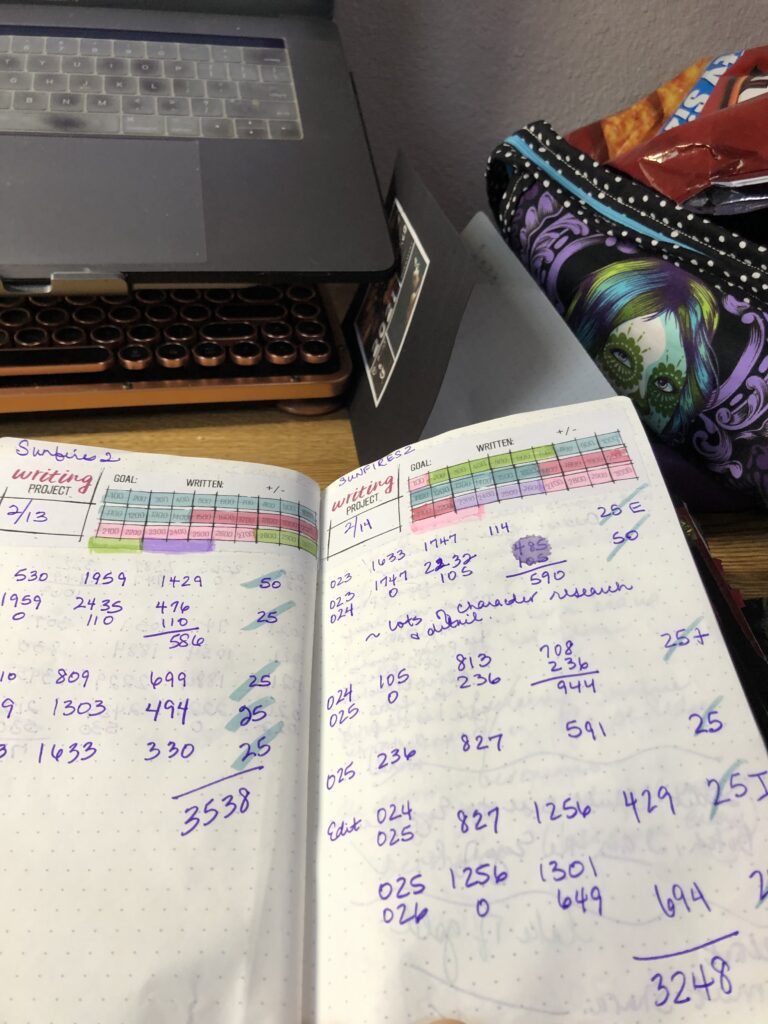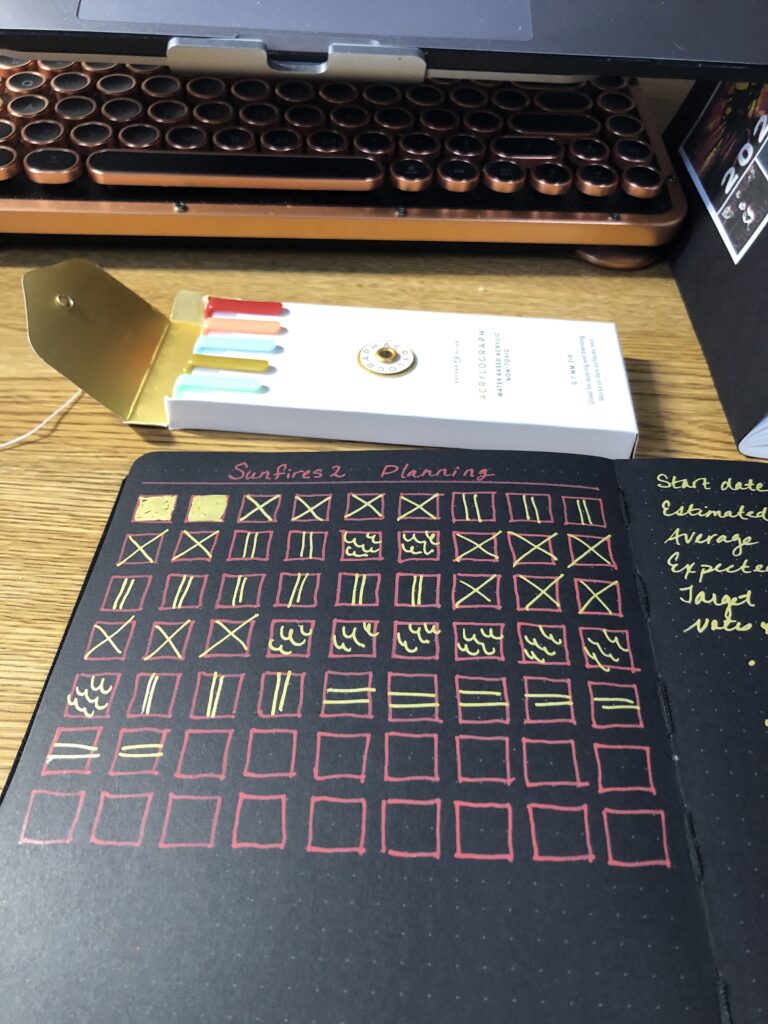Continuing the discussion from yesterday’s post (shocker, I know – two posts back to back!), I leaned hard on something I’ve already blogged about here, here, here, and here. A writing bujo, story keeper, bullet journal for my books.
I went back to all the notebooks detailing the love I have for Shara. How excited I was for her world. I flipped through page after page of sprints and notes I had made about the story and discoveries I made over time.
See, it’s easy to forget the good times when you’re stuck in the bad times. It’s easy to forget how you got out of a mess before. My stuck list (again, thanks Becca) included brainstorming and using good pens and paper. Now I can add actually READING those notes again. Drooling over the sparks of inspiration and joy that ooze on those pages.
Even more importantly, I saw that when I kept track of my word counts and sprints, there were definite patterns.
Let me stop here and explain what I mean about “sprint” because I don’t use it the way most writers probably do. I don’t race. I don’t like to race other writers. The truth is that I’m too competitive (#5 achiever) but I’m also slow (#1 intellection). I want to be the fastest person in the room and if I’m not, I’m uncomfortable. I feel dumb and slow, which only makes me slower. I put too much stress on getting words – and not serving the story. Which results in tossing out garbage that I’m not happy with.
So for me, “sprint” means “dedicated focus time.” I have an app on my phone (Flora) that allows me to set a timer (usually 25 mins). If I hit my goal, I get to grow a plant in my garden. If I grow enough plants, they actually plant a REAL tree for me. Pretty awesome!
Back to looking over my previous bujos. There was a definite trend over time when I was consistently using the word count stickers. (I use a different color highlighter for each sprint, so it’s easy to see how many words I got at a glance.)
I’ve said before that I’m an exponential writer. If you give me a deadline of one year to write a book, I’ll still write 75% of it the week before it’s due. A lot of that is my INFP personality. I need that pressure of a deadline. I thrive when the going gets tough. I need that deadline breathing down my neck to do my best work. (Another reason 2020 was so lackluster – I had to cancel the Sunfires2 release and that really took the wind out of my sails.)
That means that when I first start tracking word counts on a new project (or a “start over” writing moment), I can definitely see low days. 200 words. 250 words. Maybe 700, then back down to 200 the next day. It’s easy to get discouraged when I KNOW I’m fully capable of writing 70K in a month when I’m in the zone. It’s easy to listen to the negative voice that says something must be wrong with the book if it’s this slow. It’s stupid. No one’s going to want to read this stilted garbage.
But if I keep at it, and slowly work up the number of sprints I do, one very easy to see trend emerges. The more sprints I do, the more my word count goes up. If I can get at least 2 sprints in during a day, my average begins to stabilize around 500 words in 25 mins. If I can get up to 4-6 sprints a day, that number goes up again. I start to see some sprints with 700, 800 words.
So the biggest takeaway for me personally: it’s not about the word count in the sprint. At all. It’s about how many sprints I do. If I put the time in. If I sit down and open the file, and get through those miserable 200 word days. If I keep at it….
Eventually the magic is there. It just needs some time to emerge.
To finish Sunfires2, I estimated that I had about 30K left from where I’d stumbled and fallen into a pit of despair. Rather than shooting for a daily word count goal – which does not work for me since I’m exponential! – I sat down and drew a grid in a brand new cool black journal I got from Archer & Olive. If I had 30,000 left, and I generally get an average of 500 words per sprint (my low end), then I needed 60 sprints to finish the book, plus some extras to balance out the grid and give myself the space if I needed it. I set a goal of getting at least 2 sprints done on weekdays, ideally 4 on a good day that the Evil Day Job didn’t blow up in my face, and 6 on the weekend or days off.
And you can see what happened (pics below). Toward the end, my word count was soaring, from 700-900 a day to 3500 at the end. I was hitting the sprints. I found my pace. I finished the book. And it didn’t take all 60 sprints either, because once I kept up, I could get more words in each session. (To keep track of which sprints ended up in the black journal, I used a blue highlighter to mark through the time spot. Ha, you can see a little wine droplet too. Yeah, there was definitely some wine happening toward the end!)
I’ve already started a sprint grid for Broke Down’s epilogue and will continue to use this new journal tool going forward. (In the sprint journal, I used a different fill symbol for each day, so it was easy to see how many I managed to do each day.)


